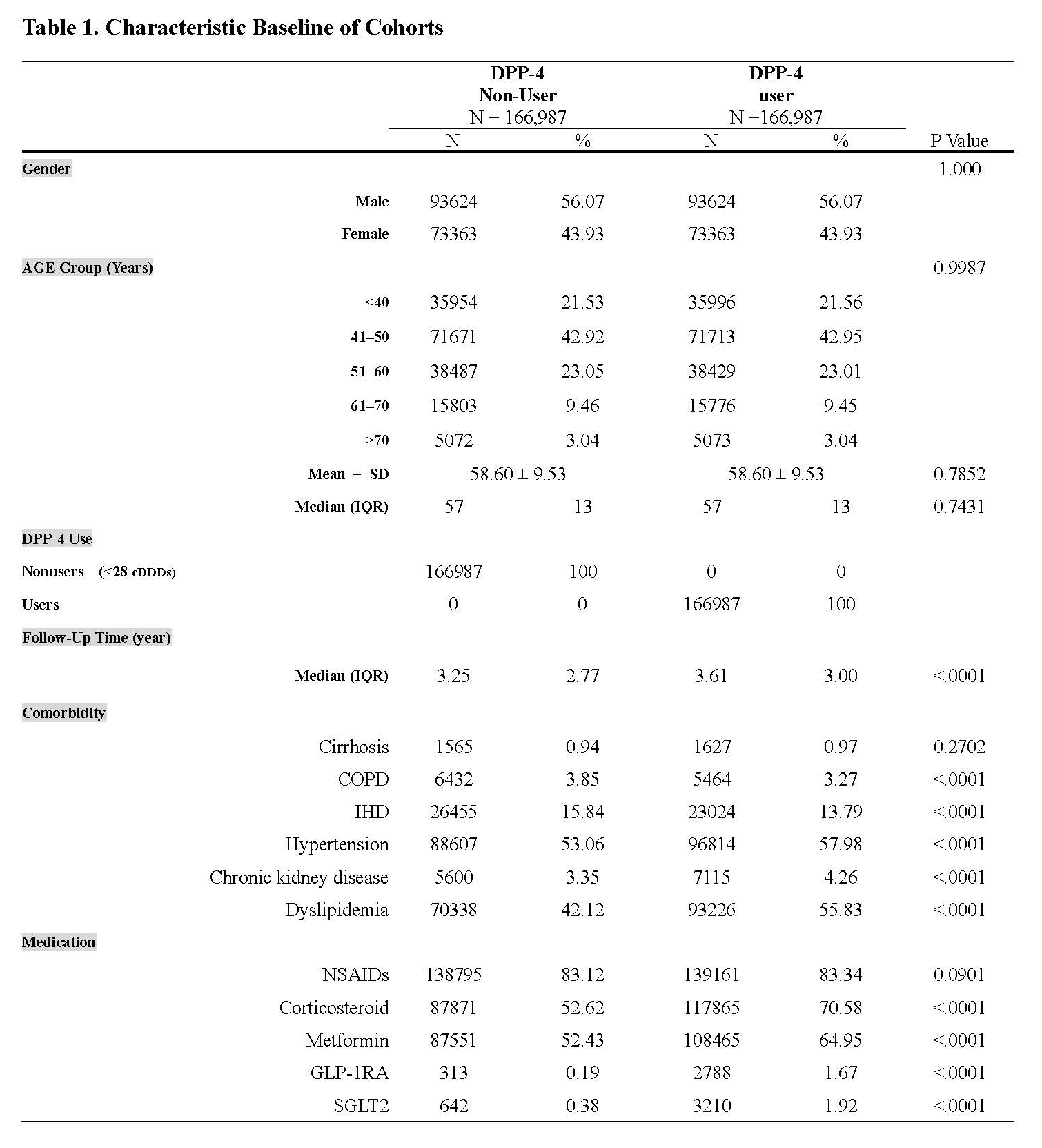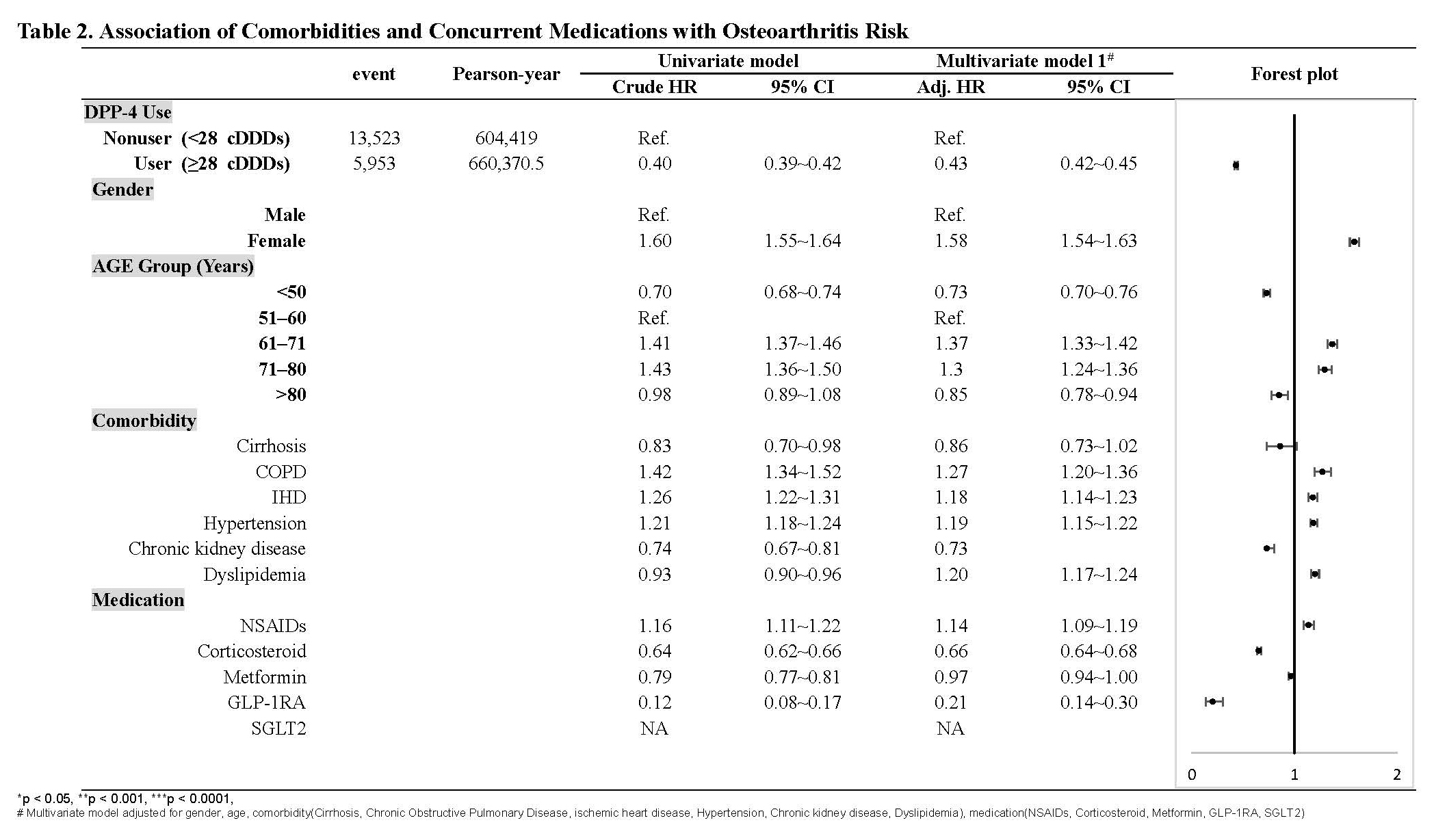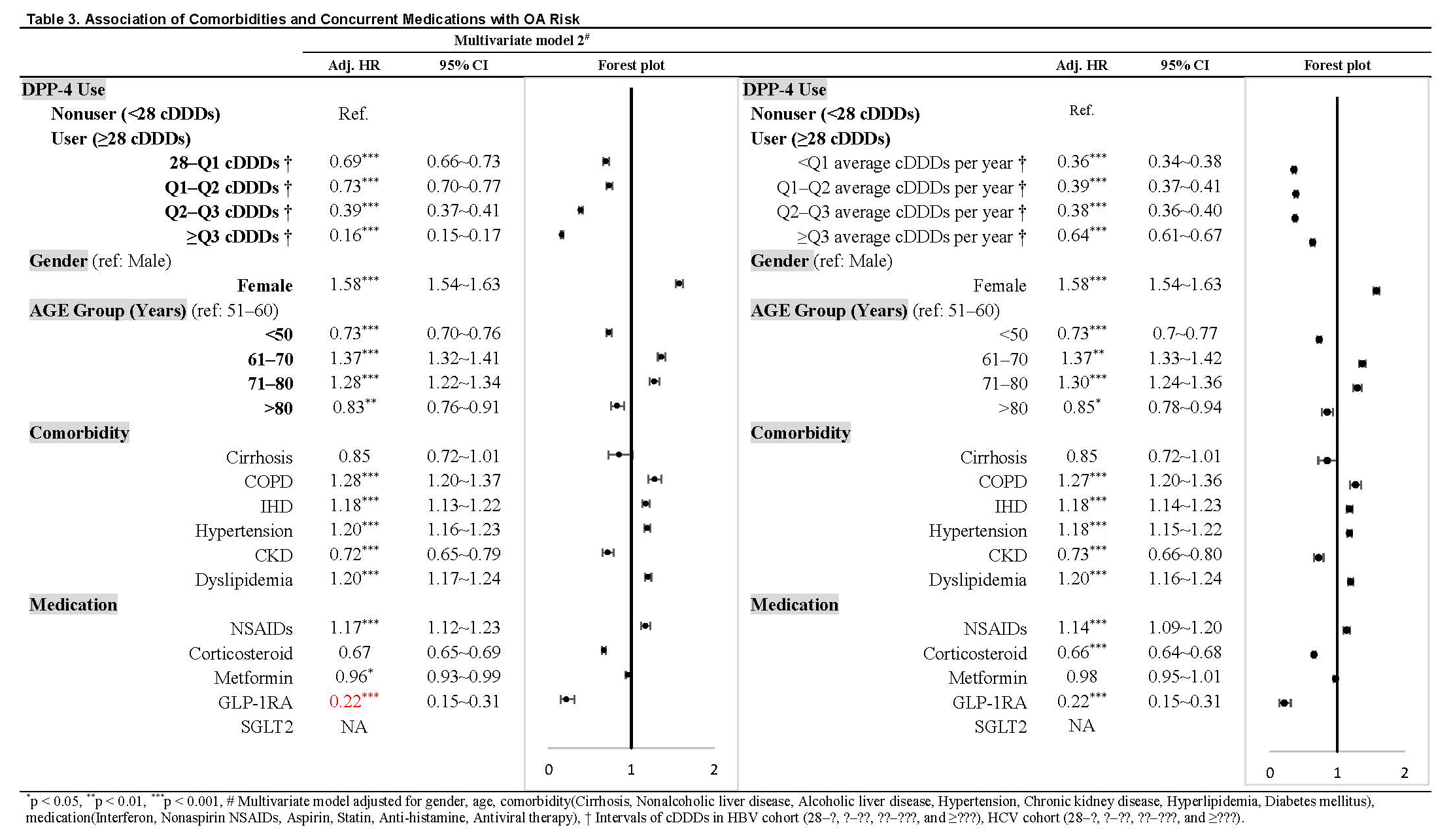Poster Session B
Osteoarthritis (OA) and related disorders
Session: (1183–1199) Osteoarthritis – Clinical Poster II
1199: Association of Dipeptidyl Peptidase-4 Inhibitor Use for Type 2 Diabetes and Incidence of OA in Taiwan
Monday, November 13, 2023
9:00 AM - 11:00 AM PT
Location: Poster Hall
- HL
Hsiang-Yen Lee, MD
Taipei Medical University Hospital
Taipei, TaiwanDisclosure information not submitted.
Abstract Poster Presenter(s)
Hsiang-Yen Lee1, Ching-Kuei Chang1, Tzu-Min Lin1, Tzu-Tung Ku2, Jin-Hua Chen2, Yu-Hsiu Chen3, Shu-Chuan Chen4 and Chi-Ching Chang2, 1Taipei Medical University Hospital, Taipei, Taiwan, 2Taipei Medical University, Taipei, Taiwan, 3Tri-Service General Hospital, Taipei, Taiwan, 4Idaho State University, Idaho State Pocatello, ID
Background/Purpose: Cellular senescence is involved in osteoarthritis (OA) development. Dipeptidyl Peptidase-4 (DPP4) is associated with senescence in OA chondrocytes. It is uncertain whether DPP4 inhibitor use is associated with reduced risk of OA in patients with type 2 diabetes mellitus. We aimed to establish whether DPP4 inhibitor use was associated with a reduced risk of OA among these patients.
Methods: We selected patients with type 2 diabetes mellitus that was diagnosed between 2008 and 2018 from the Taiwan National Health Insurance Research Database.We used Individual Matching (1:1), age ±1, same gender, same index year, same Diabetes Compilations Severity Index to balancepotential confounders between DPP4 inhibitor users and nonusers. We assessed the risks of incident OA using Cox proportional hazards regression between DPP4 inhibitor users and nonusers.
Results: We included 166,987 participants who were not treated with DPP4 inhibitor and 166,987who were treated with DPP4 inhibitor (mean age 58.60yr, standard deviation 9.53yr; 56.07% were men). In the DPP4 inhibitor use cohort, 5953 patients developed OA during a median follow-up of 3.61years (Table 1). Compared with participants who did not use DPP4 inhibitor, those who used DPP4 inhibitor had lower risks of incident OA (adjusted hazard ratio [HR] 0.43, 95% confidence interval [CI]0.42~0.45(Table 2).Furthermore, the use of concurrent medications, such as Glucagon-like peptide-1receptor agonist (GLP-1RA; 0.22 [0.15~0.31]) and Corticosteroid (0.66 [0.64~0.68]), was associated with a lower OA risk (Table 3).We observed no relationship between a dose-dependent effect of DPP4 inhibitor use and OA(Table 3).
Conclusion: DPP4 inhibitor use in patients with type 2 diabetes mellitus was associated with a significantly reduced risk of OA. Randomized controlled clinical trials in patients with osteoarthritis are warranted to determine whether DPP4 inhibitor is effective in decreasing the incidence of OA.



H. Lee: None; C. Chang: None; T. Lin: None; T. Ku: None; J. Chen: None; Y. Chen: None; S. Chen: None; C. Chang: None.
Background/Purpose: Cellular senescence is involved in osteoarthritis (OA) development. Dipeptidyl Peptidase-4 (DPP4) is associated with senescence in OA chondrocytes. It is uncertain whether DPP4 inhibitor use is associated with reduced risk of OA in patients with type 2 diabetes mellitus. We aimed to establish whether DPP4 inhibitor use was associated with a reduced risk of OA among these patients.
Methods: We selected patients with type 2 diabetes mellitus that was diagnosed between 2008 and 2018 from the Taiwan National Health Insurance Research Database.We used Individual Matching (1:1), age ±1, same gender, same index year, same Diabetes Compilations Severity Index to balancepotential confounders between DPP4 inhibitor users and nonusers. We assessed the risks of incident OA using Cox proportional hazards regression between DPP4 inhibitor users and nonusers.
Results: We included 166,987 participants who were not treated with DPP4 inhibitor and 166,987who were treated with DPP4 inhibitor (mean age 58.60yr, standard deviation 9.53yr; 56.07% were men). In the DPP4 inhibitor use cohort, 5953 patients developed OA during a median follow-up of 3.61years (Table 1). Compared with participants who did not use DPP4 inhibitor, those who used DPP4 inhibitor had lower risks of incident OA (adjusted hazard ratio [HR] 0.43, 95% confidence interval [CI]0.42~0.45(Table 2).Furthermore, the use of concurrent medications, such as Glucagon-like peptide-1receptor agonist (GLP-1RA; 0.22 [0.15~0.31]) and Corticosteroid (0.66 [0.64~0.68]), was associated with a lower OA risk (Table 3).We observed no relationship between a dose-dependent effect of DPP4 inhibitor use and OA(Table 3).
Conclusion: DPP4 inhibitor use in patients with type 2 diabetes mellitus was associated with a significantly reduced risk of OA. Randomized controlled clinical trials in patients with osteoarthritis are warranted to determine whether DPP4 inhibitor is effective in decreasing the incidence of OA.

Table 1. Characteristic Baseline of Cohorts

Table 2. Association of Comorbidities and Concurrent Medications with Osteoarthritis Risk

Table 3. Association of Comorbidities and Concurrent Medications with OA Risk
H. Lee: None; C. Chang: None; T. Lin: None; T. Ku: None; J. Chen: None; Y. Chen: None; S. Chen: None; C. Chang: None.



